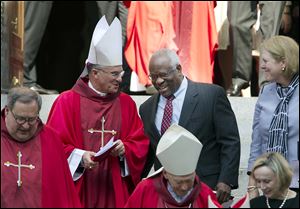
Court to begin high-profile term
Campaign contributions, race, abortion among highlights
10/7/2013
Supreme Court Justice Clarence Thomas talks with clergy following the Red Mass at the Cathedral of St. Matthew the Apostle in Washington. The Supreme Court’s new term starts today.
WASHINGTON — The Supreme Court today resumes its role as the uneasy arbiter of America’s social conflicts with a new docket that features battles over affirmative action, campaign finance, and abortion, among other divisive issues.
No single case may thrust the court into the national spotlight as did its cliffhanger ruling on the constitutionality of President Obama’s health-care law in 2012 or June’s victories for advocates of same-sex marriage.
But the upcoming term “is actually deeper in important cases than either of the last two terms,” Irv Gornstein, executive director of the Georgetown University Law Center’s Supreme Court Institute, said at a recent forum.
There is a familiar ring to several cases the justices will take up.
Campaign finance, affirmative action, legislative prayer, and abortion clinic protests all are on the court’s calendar.
The justices probably will decide in the fall whether to resolve competing lower court decisions about the new health care law’s requirement that employer-sponsored plans cover contraception.
An issue with a good chance to be heard involves the authority of police to search the cell phone found on someone they arrest.
The court may hear its first abortion case since 2007, a review of an Oklahoma law that would restrict the use of certain abortion-inducing drugs such as RU-486.
The campaign finance argument on Tuesday is the first major case on the calendar.
The 5-4 decision in the Citizens United case in 2010 allowed unlimited sums to be spent in support of or opposition to candidates, as long as the spending is independent of the candidates.
The new case, McCutcheon vs. Federal Election Commission, is a challenge to the overall limits on what an individual may give to candidates, political parties, and political action committees in a two-year federal election cycle, currently $48,600 to candidates and $123,600 in total. The $2,600 limit on contributions to a candidate is not at issue.
Among other top cases already set for review:
● Michigan is fighting to preserve a constitutional amendment that bans the use of racial preferences in education after a federal appeals court ruled that the constitutional ban is itself discriminatory.
This case, unlike last term’s look at a University of Texas admissions plan, does not involve the viability of affirmative action, but rather whether opponents of racial preferences can enshrine that ban in the state constitution.
● Massachusetts is defending a law that creates a 35-foot buffer zone at abortion clinics to limit protesters’ ability to interact with patients. The court upheld a buffer zone law in Colorado in 2000, but Chief Justice John Roberts and Justice Samuel Alito have replaced members of that majority.
● Greece, N.Y., is asking the court to uphold its practice of opening town council meetings with a prayer, despite an appeals court ruling that found the invocations a violation of the First Amendment.